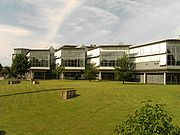
Göttingen State and University Library
Encyclopedia

The Göttingen State and University Library (German: Niedersächsische Staats- und Universitätsbibliothek Göttingen, or SUB Göttingen; English short form: Goettingen SUB) is the library for Göttingen University as well as the central library for the German State of Lower Saxony (with its central catalogue), and the library for the Göttingen Academy of Sciences
Göttingen Academy of Sciences
The Göttingen Academy of Sciences is the second oldest of the seven academies of sciences in Germany. It has the task of promoting research under its own auspices and in collaboration with academics in and outside Germany...
. It also houses the Göttinger Digitalisierungszentrum
Göttinger Digitalisierungszentrum
The Center for Retrospective Digitization in Göttingen is an online system for archiving academic journals.- See also :*JSTOR* List of retrodigitized Mathematics Journals and Monographs...
(Center for Retrospective Digitization), the GBV regional library consortium offices, and numerous projects in librarianship and related fields as well as providing such online services as its virtual library and vascoda
Vascoda
vascoda is a German web portal which offers access to scientific information in various disciplines. The name vascoda is often associated with the medieval explorer Vasco da Gama, as this implies the connotation of navigating the sea of information. Initially, though, “vascoda“ is a made-up word...
.
One of the largest libraries in Germany, the Goettingen SUB houses some 4½ million volumes as well as 13,000 holographs and other manuscripts and 350 Nachlässe (literary remains). The library works under a dispersed system, with numerous branch libraries located in various academic departments, supplementing the central collection housed in the new library building (construction completed in 1992) on the main campus and the historical library building in downtown. The library is responsible for a number of special-area collections (Sondersammelgebiete) under the German national library system. The historical library building holds manuscripts, rare books, and a significant history-of-science collection and research facility as well as works in the special-area collections, old-stock and other items. In addition, its original core, the Pauliner Church, has been made through adaptive re-use and reconstruction into an exhibition and lecture center. All newly accessioned materials as well as almost all old holdings are electronically cataloged; a small number of old holdings (some of those from the 1940s–1970s) are only searchable electronically using a "virtual catalogue."
The library holds a large collection of academic database CD-ROMs, an extensive collection of micro-forms, and collections of aural and audio-visual media.
In cooperation with the University Library "Georgius Agricola" of the Technische Universität Bergakademie Freiberg (UBF), the SUB maintains a large online collection of geoscience-related materials, the GEO-Library Experts Online, or GEO-LEO
GEO-LEO
GEO-LEO is a virtual library for the specialty fields of mining, geography, maps and astronomy. This is a free Internet portal to search for, find and obtain books, periodicals, articles, websites and maps in the context of geosciences. Free or licensed full texts, e.g. from e-journals, are...
.
In the year 2002, the Göttingen SUB won the German Library of the Year (Bibliothek des Jahres) award.
The library possesses a Gutenberg Bible
Gutenberg Bible
The Gutenberg Bible was the first major book printed with a movable type printing press, and marked the start of the "Gutenberg Revolution" and the age of the printed book. Widely praised for its high aesthetic and artistic qualities, the book has an iconic status...
(one of only four perfect vellum copies known to exist).
History
.png)
Johann Matthias Gesner
Johann Matthias Gesner was a German classical scholar and schoolmaster.He was born at Roth an der Rednitz near Ansbach. His father, Johann Samuel Gesner, a pastor in Auhausen, died in 1704, leaving the family in straitened circumstances...
, who remained in the position until his death in 1763. It soon was considered one of the leading research libraries in Germany, pioneering cataloging systems (then in large bound volumes). Christian Gottlob Heyne
Christian Gottlob Heyne
Christian Gottlob Heyne was a German classical scholar and archaeologist as well as long-time director of the Göttingen State and University Library.-Biography:He was born in Chemnitz, Electorate of Saxony...
's directorship (1763-1812) laid the basis for the library's status. However, a half century of reduced financing then weakened the library's status. Only in 1866, with official Prussian sponsorship, did the library again begin to flourish. Both Heinrich Heine
Heinrich Heine
Christian Johann Heinrich Heine was one of the most significant German poets of the 19th century. He was also a journalist, essayist, and literary critic. He is best known outside Germany for his early lyric poetry, which was set to music in the form of Lieder by composers such as Robert Schumann...
and Johann Wolfgang von Goethe
Johann Wolfgang von Goethe
Johann Wolfgang von Goethe was a German writer, pictorial artist, biologist, theoretical physicist, and polymath. He is considered the supreme genius of modern German literature. His works span the fields of poetry, drama, prose, philosophy, and science. His Faust has been called the greatest long...
used and commented on the library in their time.
External links
- The library's English-language Internet site: http://www.sub.uni-goettingen.de/index-e.html
- vifanord Virtual Library of Northern European and Baltic Studies
- http://www.vascoda.de/vascoda?ID=MAIN&LANGUAGE=en vascoda

